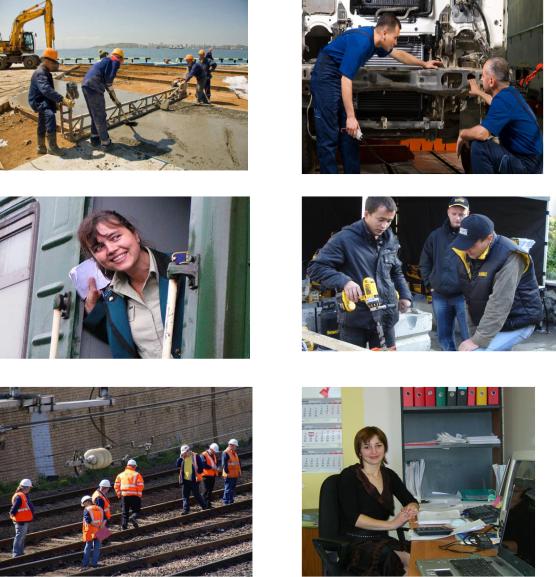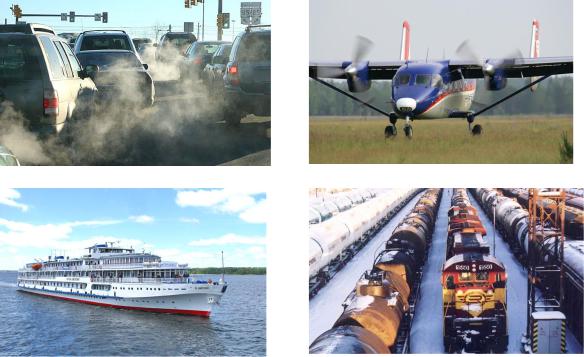
English_for_Transportation_Technology
.pdfПРЕДИСЛОВИЕ
Данное учебное пособие является частью учебно-методического комплекса по английскому языку «Технология транспортных процессов» (English for Transportation Technology). Оно создано для студентов транспортных вузов, обучающихся по специальности 190401 «Эксплуатация железных дорог».
В соответствии с федеральными государственными образовательными стандартами высшего профессионального образования, владение иностранным языком на уровне, обеспечивающем эффективную профессиональную деятельность, включено в перечень общекультурных компетенций, которыми должны обладать выпускники университетов по завершении обучения. Учебно-методический комплекс как раз и направлен на формирование и развитие у будущих инженеров навыков профессиональной коммуникации на английском языке, а также создания базы для продолжения его изучения.
Обратите внимание, что структура и логика предъявления учебного материала обусловлены комплексным подходом. В каждом разделе имеется лексический блок профессиональной терминологии; предлагаются упражнения для совершенствования навыков аудирования, устной речи, чтения и письма; в завершении раздела дается блок самоконтроля.
При работе над грамматикой следует ограничиться функциональным принципом отбора материала, предложенного авторами, – ведь объять все невозможно. Занимаясь по этому пособию, обращайтесь и к другим материалам по грамматике английского языка.
Наше пособие предполагается использовать вместе с практикумом по самостоятельной работе для студентов и методическими указаниями по организации процесса обучения для преподавателя.
Авторы
3
|
Содержание |
|
Предисловие .......................................................................................................................................................... |
3 |
|
Unit 1. Career planning .......................................................................................................................................... |
5 |
|
Unit 2. The Environmental Impacts of Transportation ......................................................................................... |
12 |
|
Unit 3. Globalisation............................................................................................................................................. |
21 |
|
Unit 4. History of the railway transport ................................................................................................................ |
27 |
|
Unit 5. The railway track ...................................................................................................................................... |
30 |
|
Unit 6. |
Motive power............................................................................................................................................ |
36 |
Unit 7. |
Goods wagons .......................................................................................................................................... |
41 |
Unit 8. |
Carriages................................................................................................................................................... |
46 |
Unit 9. |
Stations ..................................................................................................................................................... |
50 |
Unit 10. Signalling................................................................................................................................................ |
55 |
|
Unit 11. Safety requirements in maintenance documentation .............................................................................. |
61 |
|
Unit 12. Carriage of dangerous goods .................................................................................................................. |
66 |
|
Appendices |
|
|
Библиографический список ................................................................................................................................ |
82 |
|
4

UNIT 1. CAREER PLANNING
Start up
Exercise 1. Look at the pictures. Guess the job in each picture. Why do these people work? You may use the reasons from the list below.
to need money |
to change the city environment |
to care about people |
to like to be active |
to enjoy working with papers |
to enjoy helping others |
to like to be creative |
to want to use his/her education |
to prefer to be outdoors |
A B
C D
E F
Exercise 2. Make a list of your own reasons for working. Use the list from Exercise 1, or make up your own list. In small groups, discuss about your reasons of working. Talk about the perfect job for you. Answer these questions:
1)Do you have a job now? What is it?
2)What is your ideal job?
3)Why do you want to work?
4)Do your reasons for working match the job that you have now? Explain your answer.
5

5) Do your reasons for working match your ideal job? Explain your answer.
Exercise 3. Answer this question: What is your ideal job? Speak for 2 minutes.
Vocabulary
Exercise 1. Professional texts contain many new words. Some of them have definitions right in the passage. Sentences with definitions usually follow the verb be (is or are) or means. Read the sentences below and find the definitions.
Example: Data (a new word) are (the verb) information or facts (the definition).
1)Prominent means easy to see.
2)Marital status means being single or married.
3)An entry-level position is a job at a beginning or low level in a country.
4)Prospective means something that is possible in the future.
5)Context is the sentence or paragraph around a word.
6)Pristine means to be in perfect condition.
7)Brainstorming is thinking of ideas about a topic and writing them down.
8)Self-editing is checking your own work.
9)Peer editing means giving your work to a classmate to check. It helps you write better before your teacher sees your work.
10)An attitude is a feeling about something.
Exercise 2. Using dashes – and parenthesis ( ) is another way to guess the meaning of new words. In the following text written by Dorian Soul, an Engineering Apprentice, try to explain the words in italics.
When I left school, I started work for a railway company, one of the biggest in the country, as a railwayman (a person who works on a railway). My apprenticeship – a way of combining work with practical training – lasts for four years. I’m in my final year now. It’s a good mix of work, which I get paid for, and study at the local university. I have day release – the system of allowing employees days off work to go on educational courses – to attend university. I learn things like working in teams, problem-solving, communication skills, using new technologies at work, and engineering subjects. I like learning while working, but it’s quite hard. Once I’m fully qualified and have a bit more experience, I hope to get promoted to the team leader (a person who is in charge of a team of six) – more responsibility and better pay.
Did you know?
A railwayman is chiefly British. Another term – a railroader – is used in America.
Reading and translation
Exercise 1. A resume is a list of information about a person. You use it to get a job. Look at the example of a resume and answer these questions.
1)What does a resume contain?
2)How long is a resume?
3)How does a resume look?
4)What does “a position” mean?
5)What verbs are used to describe work experience?
6)Why is information about personal interests important?
7)Why are references available on request?
8)Is a Russian resume different from an example given? Why?
6

PERSONAL INFORMATION
Name |
Anthony Ivanich |
Address |
E-2 Apartment Heights Dr. |
|
Blacksburg, VA 24060 |
Phone |
(540) 555-0101 |
abcd@abc.com |
OBJECTIVE
Seek the Position of Railroad Engineer
WORK EXPERIENCE
Dates |
2002 – Present |
Employer |
ABC Works Inc., Minneapolis, MN |
Position held |
Railroad Engineer |
Main activities |
• Run Steam, Gas Railroads and Speeder trains |
and |
• Implement maintenance and safety pre-examine train and passenger car |
responsibilities |
use. |
|
• Perform safety standards. |
|
• Implement maintenance and repair to all equipment consisting of steam, |
|
gas, speeder, passenger cars, empty cars used for rail ties, dump cars and |
|
side dump cars used for track upgrading and repair. |
|
• Make required condition reports about the time and material cost |
|
estimates. |
|
• Do frequent statistics of tools and facility; give spare parts into the |
|
disposal and/or replacement. |
EDUCATION AND TRAINING
Dates |
September 1998 – August 2002 |
Organization |
Florida State University |
Qualification |
Bachelor's Degree in Transport Engineering |
Main |
Engineering technology, Management and Engineering, Safe Railway |
subjects/skills |
Operation |
covered |
|
PERSONAL SKILLS AND COMPETENCES |
|
Mother tongue |
English |
Other languages |
Good spoken French, some Russian |
Social skills |
Efficient in negotiating with customers and handling their complaints. |
|
Work well under the pressure |
Computer Skills |
Office Packages like MS Word, MS Excel, MS Access, MS PowerPoint, |
|
MS Outlook Express |
|
Operating Systems like Windows 2000, Windows XP, Windows Vista |
ADDITIONAL INFORMATION
Clean driving licence
Personal interests including rock climbing and cycling
REFERENCES
Available on request
7

Did you know?
In Britain, a brief written account of your personal details, your education, and the jobs you have had is called a CV. You can send a CV when you are applying for a job. CV is an abbreviation for ‘curriculum vitae’. It is typically sent with a job application. In America, we use a resume.
Writing
Exercise 1. A good resume has information in categories. The following chart shows some of them. Work with a partner and complete the chart. Write a definition or an example for each category from the text about a resume.
Resume Categories
Personal Data |
Career |
Work |
Education and |
Special |
Additional |
|
Objective |
Experience |
Trainings |
Skills |
Information |
facts about you (name, |
|
|
|
|
|
mailing address, |
|
|
|
|
|
telephone number) |
|
|
|
|
|
Exercise 2. Write your own resume for your ideal job. Use the form from the Reading section. When you finish, exchange resumes with a partner. Answer these questions:
1)What is in the personal data section?
2)What is your partner’s career objective?
3)Does your partner have work experience?
4)Is the education section easy to read?
5)What is in the special skills section? Is this useful information?
Exercise 3. Use information from your Personal Data section and fill in the Postgraduate Open Day Registration form given below.
Title
Full Name Date of Birth *
Contact telephone number
Mobile telephone number Email *
Verify email * Address line 1 * Address line 2 Town/City * Country
Postcode *
Please indicate whether you are a US/EU student or an international student *
Listening and speaking
First name * |
|
Last name * |
|
Day |
Month |
|
Year |
International
US/EU
Exercise 1. Before you listen to an extract from an interview, differentiate the following questions for a Railroad position into the categories. Try to answer them in pairs. Finally, think of three questions to ask the interviewer about the job.
8
Categories of an interview questions
Particular |
What you know about |
Reasons why this |
Your |
|
|
knowledge/skills |
qualifications, |
What kind of |
|||
a position/ prospective |
job is important to |
||||
you need to get this |
work experience, |
person you are |
|||
employer |
you |
||||
job |
and interests |
|
|||
|
|
|
|||
|
|
|
|
|
|
|
|
|
|
|
Interview sample questions
1)Please tell me a little about yourself.
2)What knowledge is needed to get a Railroad position?
3)What skills are required for a Railroad position?
4)What personal qualities are required for a Railroad position?
5)What work activities does a Railroad position do?
6)What should you major in to become a Railroad position?
7)What are the best colleges, universities, schools for a Railroad position?
8)What have you learned from your past jobs that related to a Railroad position?
9)Why did you leave your last job?
10)Tell me about your last position and what you did.
11)Where would you like to be in 3 years? 5 years?
12)What are your strengths and weaknesses?
13)What are top 3 skills for a Railroad position?
14)What do you know about our company?
15)Describe two or three major trends in your field?
16)Why did you choose this profession/field?
17)What is the most recent skill you have learned that related to a Railroad position?
18)Why is this job important to you?
Exercise 2. Work in pairs. Listen to the interview and answer the questions:
1)What is the Interviewee by profession?
2)What experience working with lighting or sound systems does the Interviewee have?
3)Why is the Interviewee ready to travel?
Exercise 3. Listen again. Divide into two groups. Students in Group A repeat the words after the Interviewee. Students in Group B repeat the words after the Interviewer. Imitate their pronunciation, speaking rate and intonation. Change the roles.
Exercise 4. In the following script put question marks (?) to differentiate the questions of the Interviewer.
WhatexperiencedoyouhaveinthiskindofworkI’maskilledcarpenterandlovedonealot
ofworkmakingdisplaysforexhibitionsandconferencesIt’squitesimilartostageworkdo youhaveanyexperienceworkingwithlightingorsoundsystemsIwasaroadiewitharock bandforsixmonthsThebanddidn’tlastverylong–theyweren’tverygood–butIgotalotof experiencewithsoundsystemswe’relookingforsomeonewho'spreparedtotravelforat leastfourmonthseachyearwouldthatbeaproblemforyouno,I’msingleatthemoment, andIliketravelling.
9
Exercise 5. Reproduce the dialogue in pairs. Student A acts as the Interviewee, Student B acts as the Interviewer. Change the roles.
Language spot.
Alphabetising. Determining the Part of Speech.
Exercise 1. When you need to use a dictionary, you want to be able to find words quickly. Words in a dictionary are in alphabetical order. If the first letter is the same, you need to look at the second letter. If the first and the second letters are the same, you need to look at the third letter, and so on. Now, as quickly as possible, put the words in each group in alphabetical order.
A |
B |
C |
paragraph |
skill |
need |
mark |
third |
must |
decide |
review |
efficient |
full-time |
difficult |
messy |
resume |
pen |
extraordinary |
from |
reader |
much |
probably |
several |
maybe |
right |
passage |
never |
first |
different |
extract |
detail |
second |
margin |
Exercise 2. Before you look up a word in a dictionary, you need to know its part of speech. The part of speech is the form of the word: noun, adjective, adverb, etc. A dictionary indicates the part of speech with abbreviations: n = noun; adj = adjective; adv = adverb. Find a definition for each part of speech given below.
1. a noun |
а) modifies an adjective or verb |
|
|
2. a verb |
b) is a word for a person, place, thing, or situation |
|
|
3. an adjective |
c) is usually an action word |
|
|
4. an adverb |
d) describes a noun |
|
|
5. pronoun |
e) determines the kind of reference a noun or noun group has, for example a, the |
|
|
6. article |
f) is used to connect clauses or sentences or to coordinate words in the same |
|
clause (e.g. and, but, if) |
|
|
7. conjunction |
g) you use to express a strong feeling such as surprise, pain, or horror (e.g. ah!, |
|
dear me!) |
|
|
8. interjection |
h) replaces a noun |
|
|
10. number |
i) the basic form of a verb |
|
|
11. infinitive |
j) expresses a number |
|
|
Exercise 3. Now identify the part of speech of the words in the following sentences.
1)Helena Schultz hopes to find an entry-level position at a large international engineering company.
2)She went to Siberian Transport University from 2005 to 2010.
3)There Helena took engineering courses and studied foreign languages to use for professional purposes.
4)She speaks English and Chinese fluently and has good computer skills.
10
Exercise 4. Another way to decide the part of speech is from suffix of the word. Here are
some examples: |
|
|
|
|
Suffixes for Nouns |
Suffixes for Adjectives |
Suffixes for Adverbs |
||
-tion |
|
-less |
|
-ly |
-sion |
|
-ful |
|
-ily |
-ence |
|
-ent |
|
-fully |
-ance |
|
-ant |
|
|
-er, -or, -ist |
|
-al |
|
|
-ment |
|
-ible |
|
|
-ness |
|
-able |
|
|
Now decide the part of speech of each word below from its suffix. |
||||
reader |
|
|
efficient |
|
usually |
|
|
careful |
|
possible |
|
|
question |
|
difference |
|
efficiently |
|
|
situational |
|
questionable |
||
condition |
|
|
discussion |
|
beautifully |
|
happiness |
|
|
careless |
|
|
distant |
|
engineer |
|
|
assignment |
|
possibly |
|
|
importance |
|
Key words |
|
|
|
|
ability |
1) способность; 2) умение (что-л. делать), квалификация |
|||
applicant |
соискатель |
|
|
|
apprentice |
ученик (лицо, обучающееся какой-л. профессиональной |
|||
|
деятельности у квалифицированного работника) |
|||
career objective |
цель (указывается в резюме и CV) |
|
||
CV (UK) |
профессиональная биография (в пер. с лат. "путь жизни"; краткое |
|||
|
описание образования, профессионального опыта и достижений, |
|||
|
которое составляется при устройстве на работу и т. д.; термин |
|||
|
широко используется в Великобритании и странах Европы; в США |
|||
|
используется только в области образования и медицины) |
|||
day release |
освобождение от работы на один или несколько дней для |
|||
|
повышения квалификации |
|
|
|
degree |
степень |
|
|
|
education |
образование |
|
|
|
employer |
работодатель |
|
|
|
entry-level |
первая должность при поступлении на работу (должность, на |
|||
position |
которую назначаются новые работники, не обладающие большим |
|||
|
опытом и квалификацией) |
|
|
|
interviewer |
интервьюер, опрашивающий |
|
|
|
job title |
название должности |
|
|
|
major |
профилирующая дисциплина (в колледже); дисциплина, выбранная |
|||
|
в качестве специализации (амер.) |
|
||
marital status |
семейное положение |
|
|
|
personal data |
личные данные |
|
|
|
11

qualification |
диплом; аттестат; свидетельство |
references |
рекомендации |
resume (US) |
резюме |
skills |
умения, навыки |
Social Security |
номер карточки социального страхования |
number |
|
team |
команда |
training courses |
курсы повышения квалификации |
work experience |
опыт работы |
Checklist
Assess your progress in this unit. Say which statements are true about you.
1)I can work out the meaning of words from context.
2)I know how to prepare for a job interview.
3)My listening and reading are good enough to understand most of each text in this unit.
4)I know how to write a resume.
UNIT 2. THE ENVIRONMENTAL IMPACTS OF TRANSPORTATION
Start up
Exercise 1. Transport is the only sector in which greenhouse gas emissions have considerably risen. Discuss with your partner and decide how different modes of transport pollute the environment. Which one has the most negative impact? Look at the pictures for some ideas.
A B
C D
Exercise 2. There are different environmental problems. Can you name some of them? Read information given below and guess about the type of an environmental problem.
1)Noise is the most important environmental problem for people living close to railway lines.
2)Air quality is being threatened by exhaust gas emission from the increasing road traffic.
12
